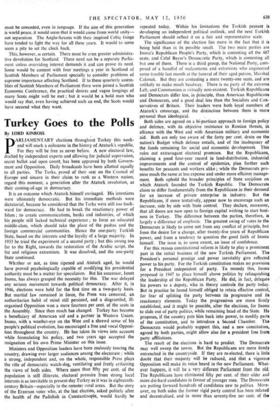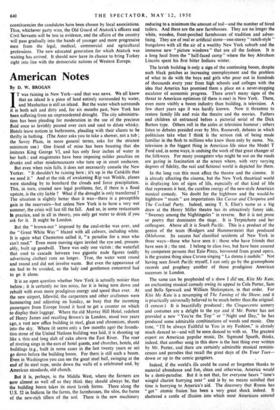Turkey Goes to the Polls
By LORD KINROSS
pARLIAMENTARY elections throughout Turkey this week- end will mark a milestone in the history of Ataturk's republic. For they will be free as never before. A new electoral law, drafted by independent experts and allowing for judicial supervision, secret ballot and open count, has been approved by both Govern- ment and Opposition. Daily broadcasts have been allotted equally to all parties. The Turks, proud of their seat on the Council of Europe and sincere in their claim to rank as a Western nation, regard this moment, a generation after the Ataturk revolution, as their coming-of-age in democracy.
It is an outcome which Ataturk himself envisaged. His intentions were ultimately democratic. But his immediate methods were dictatorial, because he considered that the Turks were still too back- ward for democracy. He had to break the reactionary power of Islam ; to create communications, banks and industries, of which his people still lacked technical experience ; to forni an educated middle-class, which should take the place of the pashas and the foreign commercial communities. Hence the one-party Turkish State, based on the interests and the loyalty of a large majority. In 1933 he tried the experiment of a second party ; but this swung too far to the Right, towards the restoration of the Arabic script, the fez and religious extremism. It was dissolved, and the one-party State continued.
Whether or not, as time ripened and Ataturk aged, he would have proved psychologically capable of modifying his presidential authority must be a matter for speculation. But his successor, Ismet Inonu, has always grasped the necessity for this. The war delayed any serious movement towards political democracy. After it, in 1946, elections were held for the first time on a two-party basis. But martial law remained in force, the Press was censored, an authoritarian habit of mind still persisted, and a disgruntled, ill- organised Opposition won a mere fourteen per cent. of the seats in the Assembly. Since then much has changed. Turkey has become a beneficiary of American aid and a partner in Western Union. Inonu, with a weather-eye on the West and a shrewd sense of his people's political evolution, has encouraged a free and vocal Opposi- tion throughout the country. He has taken its views into account while formulating his policy, and two years ago accepted the resignation of his own Prime Minister on this issue.
Ministers and Opposition leaders have been zealously touring the country, drawing ever larger audiences among the electorate ; while a strong, independent and, on the whole, responsible Press plays the role of democratic watch-dog, ventilating and freely criticising the views of both sides. Where more than fifty per cent. of the population is still illiterate, electoral pressure from strong local interests is as inevitable in present-day Turkey as it was in eighteenth- century Britain—especially in the remoter rural areas. But the story of the Erzerum voter who, at the last electicfn, asked politely after the health of the Padishah in Constantinople, would hardly be repeated today. Within his limitations the Turkish peasant is developing an independent political outlook, and the next Turkish Parliament should reflect it on a fair and representative scale.
The significance of the election lies more in the fact that it is being held than in its possible result. The two main parties are Inonu's Republican People's Party, which is contesting all the 487 seats, and Celal Bayar's Democratic Party, which is contesting all but one of them. There is a third group, the National Party, com- posed of a handful of malcontents and extremists who engineered some trouble last month at the funeral of their aged patron, Marshal Cakmak. But they are contesting a mere twenty-one seats, and are unlikely to make much headway. There is no party of the extreme Left, and Communism is virtually non-existent. Turkish Republicans and Democrats differ less, in Principle, than American Republicans and Democrats, and a good deal less than the Socialists and Con- servatives of Britain. Their leaders were both loyal members of Ataturk's entourage, and the distinction between them is more personal than ideological.
Both sides are agreed on a bi-partisan approach to foreign policy and defence, with its objective resistance to Russian threats, in alliance with the West and with American military and economic aid. Both are only too aware of the forty per cent. drain on the nation's Budget which defence entails, and of the inadequacy of the funds remaining for social and economic development. This rules out extravagant electoral promises. But the Republicans, claiming a good four-year record in land-distribution, industrial improvements and the control of epidemics, plan further such benefits for peasants and workers alike ; while the Democrats pro- mise much the same at less expense and under more efficient manage- ment. Both uphold the broader principles of State socialism on which Ataturk founded the Turkish Republic. The Democrats claim to differ fundamentally from the Republicans in their demand for an increase of private enterprise in industry. But the Republicans, if more tentatively, appear now to encourage such an increase, side by side with State control. They declare, moreover, that all doors are now open to foreign capital wishing to start busi- ness in Turkey. The difference between the parties, therefore, is largely a difference of emphasis. The greatest swing of votes to the Democrats is likely to come not from any conflict of principle, but from the desire for a change, after twenty-five years of Republican power, and from a tendency to question the good faith of Inonu himself. The issue is, to some extent, an issue of confidence.
For this reason constitutional reform is likely to play a prominent part in the initial business of the new Turkish Parliament. The President's personal prestige and power inevitably give reflected power to his party. For the Turkish constitution makes no provision for a President independent of party. To remedy this, Inonu proposed in 1947 to place himself above politics by relinquishing the leadership of the Republican Party. He did, in fact, delegate his powers to a deputy, who in theory controls the party today. But in practice he found himself obliged to retain effective control, for fear of splitting the party between its progressive and its reactionary elements. Today the progressives are more firmly established, and it might be possible, after the elections, for Inonu to slide out of party politics, while remaining head of the State. He proposes, if the country puts him back into power, to modify parts of the constitution, and to introduce a Second Chamber. The Democrats would probably support this, and a new constitution, agreed by both parties, might allow also for a president free from party affiliations.
The result of the elections is hard to predict. The Democrats may well sweep the towns. But the Republicans are more firmly entrenched in the countryside. If they are re-elected, there is little doubt that their majority will be reduced, and that a vigorous Opposition will make its voice heard in the new Parliament. What- ever happens, it will be a very different Parliament from the old. The Republicans have eliminated fifty per cent. of their older and more die-hard candidates in favour of younger men. The Democrats are putting forward hundreds of candidates new to politics. More- over, on both sides the former rigid party control has been relaxed and decentralised, and in more than seventy-five per cent. of the
constituencies the candidates have been chosen by local associations. Thus, whichever party wins, the Old Guard of Ataturk's officers and Civil Servants will be less in evidence, and the affairs of the country will pass gradually into the hands of younger and more progressive men from the legal, medical, commercial and agricultural professions. The new educated generation for which Ataturk was waiting has arrived. It should now have its chance to bring Turkey right into line with the democratic nations of Western Europe.







































 Previous page
Previous page